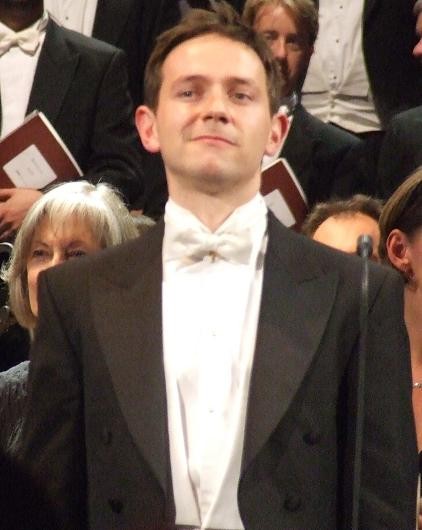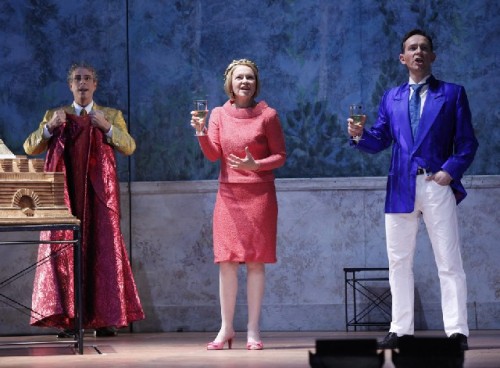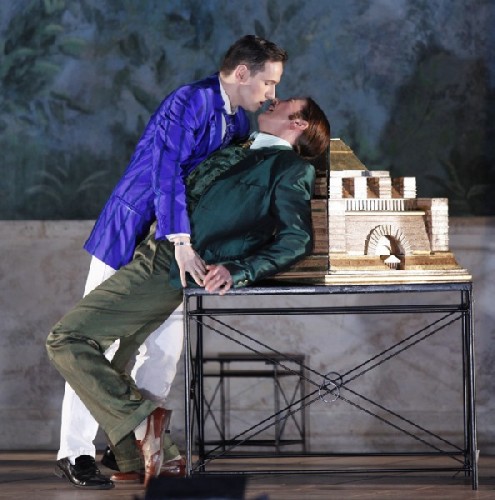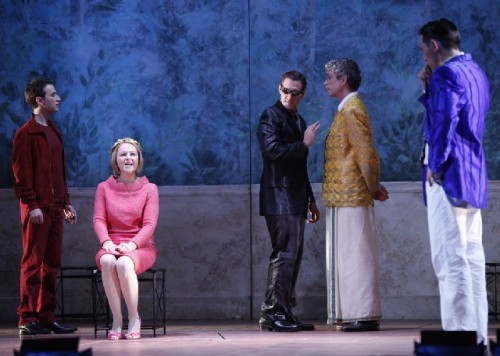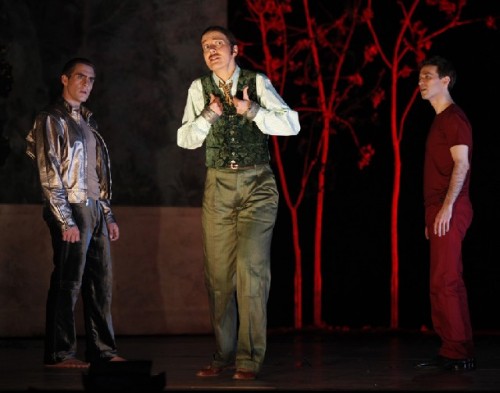Handel at the New York City Opera
Iestyn Davies Is a New Sensino
By: Susan Hall - Apr 14, 2010
PartenopeBy George Frederick Handel
Conducted by Christian Curnyn
Production by Andrew Chown based on the original production by Francisco Negrin
Stage Director Andrew Chown
Set Design by John Conklin
Costume design by Paul Steinberg
Lighting by Robert Wierzel
Cast:
Partenope Cyndia Sieden
Prince Arsace of Corinth Iestyn Davies
Prince Armindo of Rhodes Anthony Roth Costanzo
Prince Emilio of Cumae Nicholas Coppolo
Rosmira Stephanie Houtzeel
Ormonte Daniel Mobbs
New York City Opera
David Koch Theater, Lincoln Center
Performed April 15 and 17 .
212-870-5570
www.nycopera.com
Photos by Carol Rosegg
In its current production at the New York City Opera, Partenope, an opera written by George Frederick Handel almost three centuries ago, is as fresh as the idea that Handel is funnier than Haydn.
Handel's work was dropped from the opera repertoire for centuries. City Opera, among their many contributions to the form, has mounted eleven Handel operas and has been instrumental in his world-wide revival over the past three decades.
Iestyn Davies the beautiful counter tenor who performs the role of Arsace started life as a bass. Davies has sung counter tenor in Handel operas from Vienna to Zurich, and continues on this year at Le Grand Theatre in Bordeaux, Vienna, the Theater an der Wien and on to the Lyric Opera in Chicago and La Scala. Even the City Opera's neighbors in Lincoln Center Plaza have taken note. Partenope is a wonderful launching pad for Davies' agile and elegantly expressive voice. He seems a natural.
George Steel, the managing and artistic director of the City Opera, is proud of the company's Handel heritage. He points out that part of Handel's draw is his robust humor, theatricality and emotional nuance. Handel was all show biz, trying to make a buck. When everyone praised John Gay's Beggar's Opera, the new musical drama on the block, Handel countered with Partenope.
City Opera has learned to exploit the peculiarities and limitations of the opera seria form: The single rise and fall of the curtain and quick scene changes in full view of the audience. A flaming heart is represented by live flames. A dark drape suggesting torment and danger floats in one frame, and also covers the floor in a 'morning after' scene.
Visual changes reflected in the music trick the listener's expectations and deliciously torture. So too when Queen Partenope cuffs one of her prospective lovers, but then quickly frees him. Cyndia Seifen is a take charge soprano, ranging high and low to achieve her ends and not fooled by a profession of love when war is around the corner.
Handel is much beloved by singers, because he knew exactly where their voices fit. He traveled from Germany to Rome, where he made a name for himself composing sacred music, because the Pope banned opera. In Florence and Venice, Handel would stage new operas and learn his free, rich, varied melodic style from the compositions of Alessandro Scarlatti. Handel elaborated his own recitative with an emotional intensity which would not be heard again until Mozart.
Audiences in Handel's day came to hear great performers. Empowered by their box office draw, singers demanded show stoppers. Part of Handel's pleasure is that he can provide these within the context of an integrated piece. In this production, the final ensemble is lifted from another opera, but it would have been difficult to take apart any of the seamless work to drop in an another aria. Even Puccini did not integrate Vissi d'arte, which Tosca comes to stage edge to sing out of context.
Long-breathed but rhythmically flexible lines distinguish all of Handel's later music. A low chromatic aria in minor might follow several quick pieces in the major, perhaps with a radical change. Particularly at the end of an act this has great impact. Davies brings down the house with his aria at the end of Act II.
The big singer of Handel's day, Senesino, sang thirteen Handel operas at the King's Theater. Even critics wrote that he was 'beyond all criticism.' Handel was not intimidated, and called him 'a damned fool.' Senesino was reportedly a great Arsace, although his g appeared rarely and in later years he did not go above d". We may have a new Senesino, without those limitations, in Davies.
Critics wrote of Senesino: "He had a powerful, clear, equal and sweet contralto voice, with perfect intonationÂ…He never loaded adagios with too many ornaments yet delivered the original and essential notes with the utmost refinement. He sang allegros with great fireÂ…" Davies almost slipped from us, preferring to be a pop performer when Sony tried to sign him at sixteen, but his mother put the kibosh on the deal.
The overall effect of Partenope is one of winsome seriousness, because Handel can suggest the profound and common place in one breath. Ridiculous behavior is check by jowl with tender emotion, combining a spirit of play and humor with deep feeling.
Handel was at the Royal Academy when he wrote this opera. He exercised firm control over the libretto. Musical invention in the arias themselves builds characters in bits and pieces and at the same time creates dramatic conflict by mood contrasts, pace, and tonality. Arminda sung by Anthony Roth Costanzo, also a counter tenor, is retrieved from wimpdom by this sweet, lyric voice.
Handel took his music seriously. He quarreled with a fellow composer and theorist not because Matheson referred to Handel's 'interminable arias and cantatas, weak in melody', but over the continuo accompaniment of Matheson's opera Cleopatra. This led to a duel, which both composers survived.
Character revelation in Partenope comes with a duel, in which two lovers will face off. Mezzo sporano Stephanie Houtzeel, making her debut, is brilliant as a rebuffed lover who puts on pants to get her man back. A consummate actress, she deploys her rich, yet light voice to entrance and capture.
To illustrate a hunting metaphor, a pair of horns snuck into the pit just before the close of Act I when Houtzeel sings 'lo seguo sol fieo.' Flutes and a trumpet also color the score. The conductor Christian Curnyn brings out all of Handel's lively invention.
Opera would develop into a form in which singers performed together in duets, trios and quartets and the orchestra would be featured as a performer. For the sheer beauty of the line, delightfully punctuated by accompanying orchestra, Handel is incomparable.
The City Opera's mission to put fresh young ensembles on stage is admirably displayed in this LOL evening,. We come away captivated yet again by a composer, who George Steel points out, we mistakenly imagine as 'a dusty, churchy old guy.' Partenope quickly disabuses us of this notion with pure pleasure.

